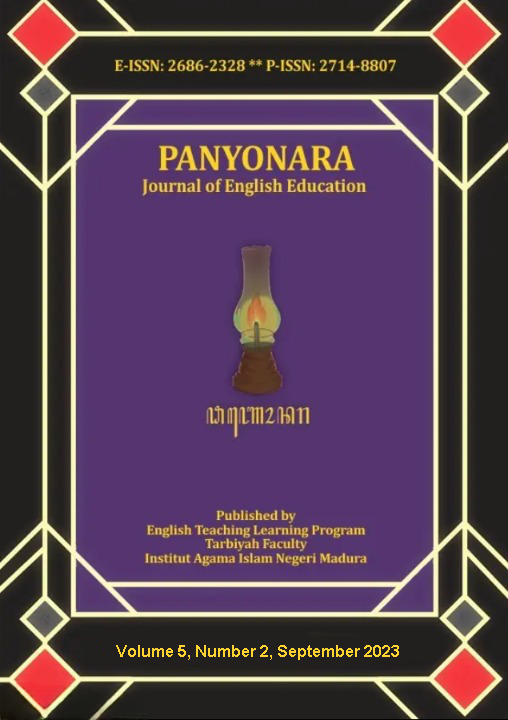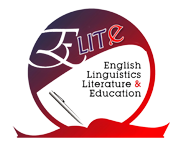Eliminating Challenges and Promoting Autonomy: The Power of the English Club for High School Students
 Abstract views: 507
,
Abstract views: 507
,
 PDF downloads: 329
PDF downloads: 329
Abstract
Abstract: The English club is one of the available platforms to learn English that has a lot of potential sides for EFL students. This study aimed to examine the role of the English club for EFL students related to how this program could help the students cope with their challenges and promote autonomy in learning English. This research employed a qualitative descriptive approach to examine and comprehend the level of challenges and participants' standpoints toward the English club. The results revealed participants' positive perception toward the English club alleviates students' challenges while learning English. This program provides a relaxed learning model outside the formal class, which boosts their confidence, engagement, and language ability. When joining an English club, students engage in several activities which promote them to be critical thinkers and autonomous learners in their language acquisition process. As an implication, the English club provides a lot of potential to benefit students in overcoming their challenges in learning English through its activities. The supportive and collaborative environment provided by the English club fostered a sense of less stress and encouraged students to take charge of their language learning process.
Downloads
References
Abd. Kadir, S. (2021). A Review of Learning Strategies Towards Learning Outcome. International Journal of Social Science and Human Research, 04(12). https://doi.org/10.47191/ijsshr/v4-i12-26
Agung, A. S. N. (2019). Current Challenges in Teaching English in Least-developed Region in Indonesia. SOSHUM : Jurnal Sosial Dan Humaniora, 9(3), 266–271. https://doi.org/10.31940/soshum.v9i3.1317
Ahmed, S. A., & Dakhiel, M. A. (2019). Effectiveness of Learner-Centered Teaching in Modifying Attitude Towards EFL and Developing Academic Self-Motivation Among The 12th Grade Students. English Language Teaching, 12(4), 139. https://doi.org/10.5539/elt.v12n4p139
Amaniarsih, D. S., Juliana, J., & Darmayanti, E. (2022). Improving Students’ Speaking Skill at Grade X at SMA Nurul Hasanah Tembung Through Community Language Learning Method. Warta Dharmawangsa, 16(3), 299–312. https://doi.org/10.46576/wdw.v16i3.2225
Amita, S., Tavriyanti, L., & Ernati. (2015). The Effect of The English Club Program Toward The Second. Language Teaching Journal, 1(1), 1–12.
Anggraeni, N. (2021). Improving the Quality Of Education Through The Application of Students Centered Learning: A Theoretical Review. Eduvest - Journal Of Universal Studies, 1(7), 603–607. https://doi.org/10.36418/edv.v1i7.99
Ariza, E. N. (2002). Resurrecting “Old” Language Learning Methods to Reduce Anxiety for New Language Learners: Community Language Learning to The Rescue. Bilingual Research Journal, 26(3), 717–728. https://doi.org/10.1080/15235882.2002.10162586
Ashraf, H., & Salami, M. (2014). Web-Based Language Club Affecting EFL Learners’ Proficiency: a Case of Iranian Learners. English Review: Journal of English Education, 2(2), 1–14.
Astari, A. M., & Hadi, M. S. (2022). Creating English Environment at School Through English Club Extracurricular. Jurnal Studi Guru Dan Pembelajaran, 5(2), 185–190. https://doi.org/10.30605/jsgp.5.2.2022.1663
Awalya, S. S., Handayani, I., & Rahmawati, E. (2010). Students ’ Perception on the Use of English Debate Extracurricular to Improve Students ’ Speaking and Critical Thinking Skill in SMA La Tansa. Annual International Senimar on English Language Teaching (AISELT), (2010), 234–248.
Bahar, A. K., & Latif, I. (2019). Society-based English Community (SOBAT): EFL Learners’ Strategy in Learning and Practicing English Outside the Walls. Jurnal Ilmu Budaya, 7(2), 255–265. Retrieved from https://journal.unhas.ac.id/index.php/jib/article/view/7769
Biwer, F., Egbrink, M. G. A. oude, Aalten, P., & de Bruin, A. B. H. (2020). Fostering Effective Learning Strategies in Higher Education: A Mixed-methods Study. Journal of Applied Research in Memory and Cognition, 9(2), 186–203. https://doi.org/10.1016/j.jarmac.2020.03.004
Brown, H. D. (1977). Some Limitations of C-L/CLL Models of Second Language Teaching. TESOL Quarterly, 11(4), 365. https://doi.org/10.2307/3585732
Brown, H. D., & Lee, H. (2015). Teaching by Principles: an Interactive Approach to Language Pedagogy. In Pearson Education (4th ed.). New York, USA: Pearson Education.
Destrianti, E., Sabaruddin, S., & Hati, G. M. (2019). The Perception of The English Club Members of The English Department Students Association (EDSA) Toward Their Club. Journal of English Education and Teaching, 2(3), 1–6. https://doi.org/10.33369/jeet.2.3.1-6
Ekawati, R. A., & Sarie, R. F. (2021). English Club to Develop English Language Skills: A Case Study of An Elementary School in Indonesia. Elementary Education Journal, 1(1), 55–59. https://doi.org/10.53088/eej.v1i1.159
Elnadeef, E. A. E., & Abdala, A. H. E. H. (2019). The Effectiveness of English Club as Free Voluntary Speaking Activity Strategy in Fostering Speaking Skill in Saudi Arabia Context. Online Submission, 2(1), 231. https://doi.org/10.32996/ijllt.2019.2.1.28
Fitriany, S., Yuliani, S., Sulaiman, M., & Rositasari, T. (2021). The Importance of English Club: A Case at English Education Study Program Universitas Muhammadiyah Palembang. English Community Journal, 5(2), 91–101. https://doi.org/https://doi.org/10.32502/ecj.v5i2.3845
Halimah, H. (2018). Boosting Students’ Speaking Ability Through Community Language Learning. Studies in English Language and Education, 5(2), 204–216. https://doi.org/10.24815/siele.v5i2.9697
Harisiswana, L. (2017). Investigating The Role of English Club Extracurricular Activity in Improving Students’ Mastery in English at SMAN 3 Jambi. Repository Universitas Jambi, 1–8.
Hia, R. H. S., Herdi, H., & Abbas, M. F. F. (2016). An Analysis of Students’ Speaking Ability in English Conversation Club (ECC) Program at The 3rd Semester. Lectura : Jurnal Pendidikan, 7(1), 130–138. https://doi.org/10.31849/lectura.v7i1.244
Hijrah, H., & Umar, N. H. (2021). English Meeting Club: Students’ Perception and Their Speaking Skill. Journal of Development Research, 5(2), 171–176. https://doi.org/10.28926/jdr.v5i2.181
Ibrahim, M., & Mursyid, A. M. M. (2018). Improving The Speaking Ability of Secondary School Students Through Community Language Learning (CLL) in The Indonesian Context. International Journal of Humanities and Innovation (IJHI), 1(3), 20–27. https://doi.org/10.33750/ijhi.v1i3.20
Jayanthi, N. S., & Kumar, R. V. (2016). Use of ICT in English Language Teaching and Learning. Journal of English Language and Literature (JOELL), 3(2), 34–38.
Jenkins, J. (2019). English Medium Instruction in Higher Education: The Role of English as Lingua Franca. In Second Handbook of English Language Teaching (pp. 91–108). https://doi.org/10.1007/978-3-030-02899-2_7
Juliana, J. (2022). English Club Activities to Increase the Nursing Students’ Motivation in Learning English: Students’ Perception. Lingua Didaktika: Jurnal Bahasa Dan Pembelajaran Bahasa, 16(2), 144. https://doi.org/10.24036/ld.v16i2.117001
Köse, T., & Saygılı, K. (2016). Students in The Clubs: How to Foster Learner Autonomy? International Technology, Education and Development Conference, 5924–5931. https://doi.org/10.21125/iceri.2016.0340
Kurnia, K. (2019). Encouraging Students to Improve Speaking Skills Through Community Language Learning. Journal of Advanced English Studies, 2(1), 1. https://doi.org/10.47354/jaes.v2i1.48
Kurniasih, K., Rahmati, N. A., Umamah, A., & Widowati, D. R. (2019). English Conversation Class (ECC) Untuk Menciptakan English Environment di SMA Islam Nusantara (SMAINUS). JIPEMAS: Jurnal Inovasi Hasil Pengabdian Masyarakat, 2(2), 161. https://doi.org/10.33474/jipemas.v2i2.2571
Linh, N. T. T., & Yen, P. H. Y. (2022). EFL Teachers’ Strategies and Challenges in Promoting High School Students’ Autonomy in Vocabulary Learning: A Qualitative Study. European Journal of Education and Pedagogy, 3(5), 4–9. https://doi.org/10.24018/ejedu.2022.3.5.439
Mauranen, A. (2003). The Corpus of English as Lingua Franca in Academic Settings. TESOL Quarterly, 37(3), 513. https://doi.org/10.2307/3588402
Melviza, Z., Bahri, S., & Erdiana, N. (2017). Students’ Perception Toward English Club Activities. Research in English and Education Journal, 2(June), 101–109.
Miles, B. M., Huberman, A. M., & Saldana, J. (2014). Qualitative Data Analysis A Methods Sourcebook (3rd Editio). Arizona: SAGE Publications.
Muhammad, M. (2020). Promoting Students’ Autonomy through Online Learning Media in EFL Class. International Journal of Higher Education, 9(4), 320. https://doi.org/10.5430/ijhe.v9n4p320
Mumary Songbatumis, A. (2017). Challenges in Teaching English Faced by English Teachers at MTsN Taliwang, Indonesia. Journal of Foreign Languange Teaching and Learning, 2(2). https://doi.org/10.18196/ftl.2223
Osborne, J., & Dillon, J. (2010). The Role of Language in The Learning and Teaching of Science. In Good Practice In Science Teaching: What Research Has To Say (p. 351). United Kingdom: McGraw-Hill Education (UK).
Palupi, R. E. A., Ruspitasari, L., & Asiyah, S. (2019). Instructors’ Strategies of SMAGA English Club (SEC) in Motivating Students in Learning Speaking at SMAN 3 Ponorogo in The Academic Year of 2018/2019. At-Tarbawi: Jurnal Kajian Kependidikan Islam, 4(1), 26. https://doi.org/10.22515/attarbawi.v4i1.1605
Rahmawati, A. (2022). EFL Students’ Critical Thinking in Speaking Activities (A Descriptive Study at English Conversation Club (ecc)). Proceedings of the 6th International Conference on Science, Education and Technology (ISET 2020), 574(Iset 2020), 211–220. https://doi.org/10.2991/assehr.k.211125.040
Rahmiani, N., & Malena, N. M. (2020). The Model of Students English Club Contribution to Writing Motivation and Punctuation Awareness Improvement. Journal of English Educational Study (JEES), 3(1), 71–80. https://doi.org/https://doi.org/10.31932/jees.v3i1.672
Raskova Octaberlina, L., & Ikhwanul Muslimin, A. (2022). Fostering Students’ Speaking Ability through English Club Activities. Arab World English Journal, 13(3), 414–428. https://doi.org/10.24093/awej/vol13no3.27
S. Alqurashi, H., & A. Althubaiti, H. (2021). The Role of Language Proficiency in Willingness to Communicate: A Case Study of Saudi EFL Learners. Arab World English Journal, 12(2), 469–478. https://doi.org/10.24093/awej/vol12no2.32
Sheokarah, J., & Pillay, A. (2021). Beyond Classroom Walls: The Role of A Co-Curricular English Club in Supporting Second Language Learning. Journal of Education, (82), 113–128. https://doi.org/10.17159/2520-9868/i82a07
Su, J. (2022). Community Language Learning and Learner Anxiety. Frontiers in Humanities and Social Sciences, 2(8), 1–4. https://doi.org/10.54691/fhss.v2i8.1650
Subekti, A. S., Winardi, A., Susyetina, A., & Lestariningsih, F. E. (2022). Online English Club for High School Students: Going Globa. ABDIMAS: Jurnal Pengabdian Masyarakat, 4(2), 770–781. https://doi.org/10.35568/abdimas.v4i2.1387
Surahman, D., & Sofyan, A. (2021). The Effect of Community Language Learning and Emotional Intelligence on Students’ Speaking Skill. Lentera Pendidikan : Jurnal Ilmu Tarbiyah Dan Keguruan, 24(1), 82. https://doi.org/10.24252/lp.2021v24n1i8.
Swatitis, B. B. (2020). Indonesian EFL Community-Based English Club and Its Contribution on Autonomous Reading Behavior. Retain, 8(3), 96–107. Retrieved from https://ejournal.unesa.ac.id/index.php/retain/article/view/33356/30828
Teng, H.-C. (2012). A Study on the Teach Ability of EFL Communication Strategies. Procedia - Social and Behavioral Sciences, 46, 3566–3570. https://doi.org/10.1016/j.sbspro.2012.06.106
Wahyuningsih, S., & Afandi, M. (2020). Investigating English Speaking Problems: Implications for Speaking Curriculum Development in Indonesia. European Journal of Educational Research, 9(3), 967–977. https://doi.org/10.12973/EU-JER.9.3.967
Warni, S., Aziz, T. A., & Febriawan, D. (2018). The Use of Technology in English As a Foreign Language Learning Outside the Classroom: An Insight into Learner Autonomy. LLT Journal: A Journal on Language and Language Teaching, 21(2), 148–156. https://doi.org/10.24071/llt.v21i2.1259
Xu, H. (2018). The Use of Mother Tongue in Foreign Language Teaching. Proceedings of the 2018 3rd International Conference on Modern Management, Education Technology, and Social Science (MMETSS 2018). Paris, France: Atlantis Press. https://doi.org/10.2991/mmetss-18.2018.59
Yu, R. (2020). On Fostering Learner Autonomy in Learning English. Theory and Practice in Language Studies, 10(11), 1414. https://doi.org/10.17507/tpls.1011.09
Yuliandasari, A., & Kusriandi, W. (2018). Students’ Perception on English Club Extracurricular in Speaking Practices at Madrasah. Academic Journal Perspective : Education, Language, and Literature, 3(2), 305. https://doi.org/10.33603/perspective.v3i2.1670
Zulhermindra. (2018). Promoting English Club as An Extracurricular Activity for Young Learners: Suggested Procedure. 3rd International Conference on Education 2018 - Teachers in the Digital Age, (2001), 389–400.
The journal uses an Open Access policy under a Creative Commons Attribution-NonCommercial 4.0 International License. Authors who publish with this journal agree to the following terms:
- Authors retain copyright and grant the journal right of first publication with the work simultaneously licensed under a Creative Commons Attribution License that allows others to share the work with an acknowledgment of the work's authorship and initial publication in this journal.
- Authors are able to enter into separate, additional contractual arrangements for the non-exclusive distribution of the journal's published version of the work (e.g., post it to an institutional repository or publish it in a book), with an acknowledgment of its initial publication in this journal.
- Authors are permitted and encouraged to post their work online (e.g., in institutional repositories or on their website) prior to and during the submission process, as it can lead to productive exchanges, as well as earlier and greater citation of published work.
















